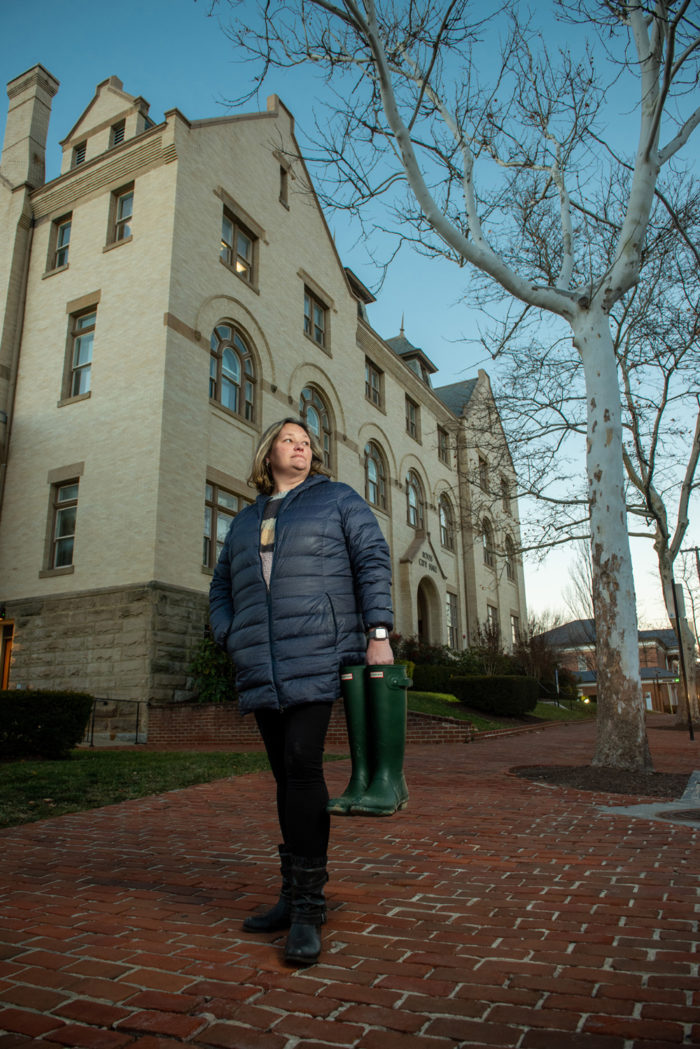“It only takes that one storm”: Virginians are solving flooding problems thanks to RGGI money
There was the flood after Hurricane Ida in 2021. There was flooding after days of heavy rainfall in 2018. There was so much flooding after Hurricane Agnes in the 1970s that residents still talk about it today.
“A lot of people think you have to be coastal or on a big river to deal with flooding,” says Winchester City Engineer Kelly Henshaw. “That’s just not true.”
Henshaw works for the city of Winchester, Virginia, which was founded in 1744 in the mountains and farmland of what is now the Shenandoah Valley. She works on floodplain administration, infrastructure improvement projects, and public improvement projects done by private entities.
In other words: if it might involve flooding, it involves Henshaw.
“Our streams aren’t huge,” Henshaw explains, “but it only takes that one storm, and those channels can’t hold all that water.”
Until Virginia began participating last year in the Regional Greenhouse Gas Initiative, known as “Reggie” from its acronym RGGI, Winchester had trouble getting the funds it needed to deal with flooding.
It’s a win-win: we’re helping less fortunate folks in our area improve their living situation, and it will help the whole of the city
Kelly Henshaw, Winchester City Engineer
Flood funding flows
In 2016, the state established a new fund to help communities impacted by recurrent flooding. The fund — now known as the Community Flood Preparedness Fund — provides localities with resources to prevent and minimize damage from flooding through measures like vulnerability assessments, flood preparedness strategies, and drainage improvement projects.
There was just one problem: there was no source of money earmarked for the new fund.
“Winchester’s a really old city. Our infrastructure is old, and some parts don’t have any drainage infrastructure at all, not even pipes,” says Henshaw. “We’ve been trying to get money from the state, but before this new RGGI funding pool, we always got beat out.”
In July a heavy summer storm sent water rushing over a street in Winchester’s historic downtown. (@City of Winchester)
City Engineer Kelly Henshaw discusses solutions to managing high water events in downtown Winchester, Virginia.
Pros of RGGI
RGGI, a successful program to reduce pollution, directly helps localities like Winchester. Utilities in Virginia have to buy an allowance for every ton of carbon dioxide that comes out of their power plant. Virginia invests the money that it receives from the sale of the allowances in energy efficiency measures — and, through the Community Flood Preparedness Fund, flood resilience.
Almost half of Virginia’s RGGI proceeds go to the Flood Fund, and at least a quarter of the fund goes directly to helping Virginia’s low-wealth communities. Sixteen percent of Winchester residents live below the poverty line, and the median income in the city is $16,000 below the state average.

“A good bit of the city’s incomes put us in that low-income demographic, but one of the hooks for this funding was that actually means we can get money for these projects that wouldn’t otherwise be available to us,” explains Henshaw. “So it’s a win-win: we’re helping less fortunate folks in our area improve their living situation, and it will help the whole of the city.”
Flood resilience across Virginia
Virginia has already awarded two rounds of flood resilience grants from its participation in RGGI so far, totaling $32.3 million in just one year.
The grants are going to flood prevention and protection projects all across the Commonwealth, from Virginia’s Eastern Shore to its southwestern reaches, and everywhere in-between—including Winchester.
“I hope having this flood resilience plan means I can pull it out, and say, ‘We’ve been planning “this,” and we need “this,” and now we’re finally getting to do it,’” says Henshaw.
Winchester was awarded more than $65,000 to develop a citywide flood resilience plan. It won’t just upgrade the city’s existing stormwater management system: it will maximize nature-based solutions to help stop flooding from happening in the first place.
“I love being able to solve problems for our citizens. But being able to improve the city is something I’m so proud of: to undertake projects that really do make a difference,” says Henshaw. “We like to joke that because a lot of our work is underground you can’t see it when we’re done — but that means the systems are better, people are better, we can serve our citizens better.”
Thanks to RGGI funding, a growing list of cities, counties, and communities all across Virginia will now be able to say the same thing.
